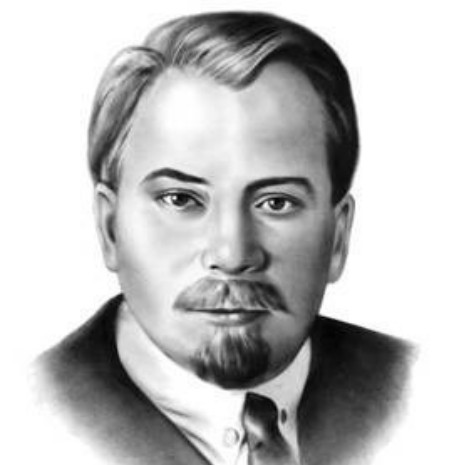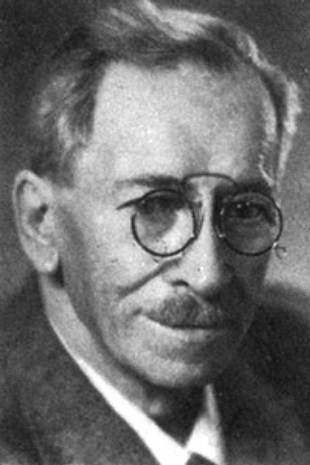Oles, Oleksander
Oles, Oleksander [Олесь, Олександер; Oles'; pseudonym of Олександер Кандиба; Oleksander Kandyba], b 5 December 1878 in Bilopillia, Sumy county, Kharkiv gubernia, d 22 July 1944 in Prague. Poet. He studied at the Kharkiv Institute of Veterinary Science (now Kharkiv State Zootechnical-Veterinary Academy) and worked in the Kharkiv zemstvo as a veterinarian. From 1911 he worked on the editorial board of Literaturno-naukovyi vistnyk in Kyiv and for the Lan publishing house. He emigrated in 1919, first to Budapest and then to Vienna, where in 1920 he was editor of the journal Na perelomi and headed the Union of Ukrainian Journalists and Writers Abroad. From 1924 he lived in Prague. He began to publish his work in 1903, and his first collection, Z zhurboiu radist' obnialas' (Joy and Sorrow Embraced, 1907), gained him enormous popularity. His second collection, Poeziï (Poems, 1909), shared many of the themes and moods of the first. In the poems there is a duality of concern: hopes for national liberation and disappointment at the defeat of the Revolution of 1905. Those themes continue in his next collection, Tvory (Works, 1910), and in Poeziï (Poems, 1917), a poetic cycle on the national revolution in Ukraine in 1917. Oles also wrote dramatic poems and études, among them ‘Po dorozi v Kazku’ (On the Way to Fairy Tale Land, 1910) and ‘Nad Dniprom’ (By the Dnipro River, 1911), which were published in the collections Dramatychni etiudy (Dramatic Etudes, 1914) and Khves'ko Andyber (1917).
The poetry collections that Oles wrote as an émigré resound with longing for his native land: Chuzhynoiu (In Foreign Lands, 1919), Poeziï (Poems, 1931), and Komu povim pechal' moiu (Whom Can I Tell of My Sorrow, 1931). The collection of historical poems Mynule Ukraïny v pisniakh: Kniazhi chasy (Ukraine’s Past in Song: The Princely Era, 1930) holds a special place among his works. Oles’s satirical poems on the subject of émigré life were written under the pseudonym V. Valentyn, and only the first part of the collection, Perezva (Postwedding Party, 1921), was published. Many of his works were not published during his lifetime, such as the satirical comedies ‘Revizor z Kam’iantsia’ (The Inspector from Kamianets-Podilskyi), ‘Vlada za kordonom’ (The Authority beyond the Border), and ‘Narodnyi sud’ (The People’s Court).
In children's literature Oles translated into Ukrainian Kazky (Märchen, 1911) by W. Hauff and ‘Arabs'ki kazky’ (Arabian Tales, 1917). He also wrote original versified stories and plays, such as ‘Zlydni’ (Hard Times, 1927), ‘Solom’ianyi bychok’ (The Little Straw Bull, 1927), ‘Mykyta Kozhum’iaka’ (1929), ‘Myslyvets' Khrin' ta ioho psy’ (The Hunter Khrin' and His Dogs, 1944), and ‘Babusyna pryhoda’ (Grandma’s Adventure, 1959).
The poetry of Oles is characterized by its form, which often imitates the structure of the folk song or popular song, by its sloganlike lexicon, frequent repetition, and anaphora, and by its facile rhythm, masterfully captured images of nature, and subtle mood. Those qualities, as well as the poetry’s deeply patriotic motifs and sincerity of expression, ensured its popularity and its inclusion in many anthologies. Composers such as Mykola Lysenko, Yakiv Stepovy, and Kyrylo Stetsenko wrote music to the words of the poems. Oles was popular in the Ukrainian SSR until the 1930s by which time there were three editions of his Vybrani tvory (Selected Works, 1925, 1929, 1930). His works were subsequently banned for over 20 years; although the ban was lifted in the late 1950s, until 1991 his works were interpreted according to the prevailing Communist Party policy and published with restrictions, as Vybrane (Selections, 1958) and Poeziï (Poems, 1964). Preliminary work on a more complete publication of Oles’s works was started in the mid-1980s. A two-volume edition appeared in Kyiv in 1990.
Ivan Koshelivets, Bohdan Kravtsiv
[This article originally appeared in the Encyclopedia of Ukraine, vol. 3 (1993).]

.jpg)
